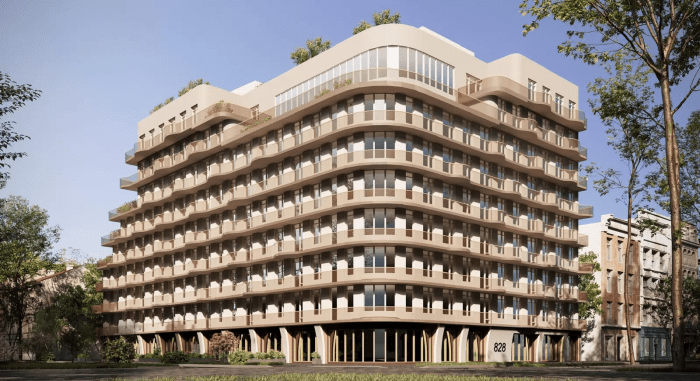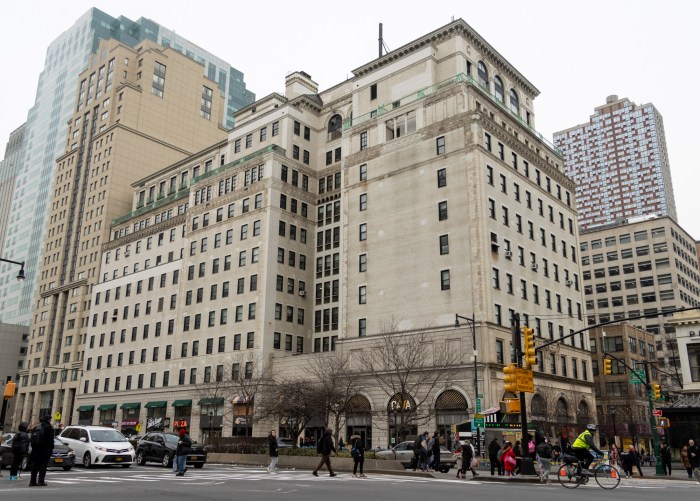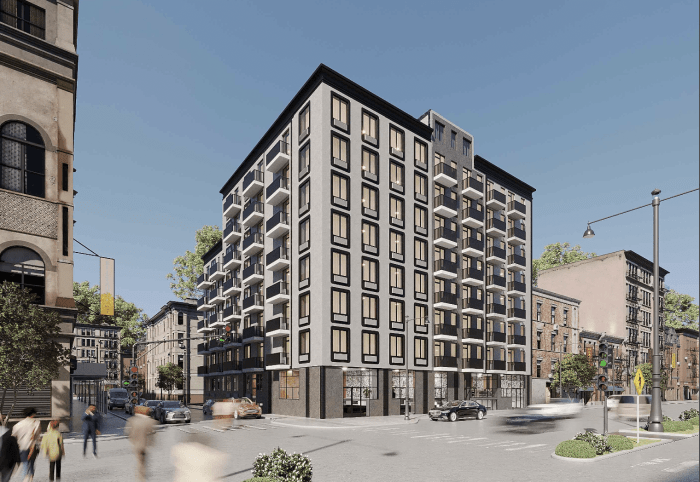The city next month will determine the fate of two controversial towers that developers want to build on Crown Heights lots near the Brooklyn Botanic Garden, with Council set to vote on a rezoning the builders need to proceed before the end of the year, following the City Planning Commission’s approval of the request last month.
Council by Dec. 24 must weigh in on the application to upzone Carroll and Crown street lots near Franklin Avenue, where developers Cornell Realty Management and Carmel Partners want to build 16-story towers with some below-market-rate units a stone’s throw from the horticultural museum that opponents argue will cast harmful shadows on the green space.
The looming decision will come more than a year after Cornell bigwigs — who recently sold one of the development sites to Carmel — withdrew a similar rezoning request due to overwhelming criticism from Botanic Garden–lovers as far away as the United Kingdom. And it more or less rests in the hands of Crown Heights Councilwoman Laurie Cumbo, who will cast the key Council vote as the project sits in her district.
Cumbo grilled the developers at a Nov. 15 hearing of a Council subcommittee on zoning, at one point asking Carmel reps how gentrification makes them feel. And the councilwoman later told this newspaper that despite the towers’ so-called affordable housing, the project as is requires more community-focused amenities, but she stopped short of explaining specific changes she expects the builders to make to win her support.
“During the zoning subcommittee hearing, I was able to bring many of my concerns with this project to light,” Cumbo said in a Nov. 20 statement. “Carmel Partners have a lot of work to do to make this development a true community asset, and I look forward to hearing more from them before the subcommittee vote in the coming weeks.”
Last year, Cumbo voted in favor of another polarizing project in the area, the redevelopment of Crown Heights’s Bedford-Union Armory, which she initially opposed but came around to after getting the builder behind it to make last-minute changes, including cutting planned condos and adding more below-market-rate housing, that she felt would benefit the community.
Cornell and Carmel’s lots at 931 Carroll St. and 40 Crown St. are currently zoned for structures seven stories or less due to a 1991 downzoning of land within a 13-block radius of the Botanic Garden, whose leaders started to push the city to set the height limit years earlier, amid construction of the Steinhardt Conservatory near the green space’s Washington Avenue border.
The conservatory’s architect Jerry Olanoff warned City Planning Commission bigwigs of the “relatively imminent need for protection from shadows cast on the greenhouses by any adjacent new construction,” according to a letter he penned to the planners back then.
But today’s Botanic Garden stewards don’t believe shadows cast by Cornell and Carmel’s proposed towers will harm the growing patch, stating numerous times throughout the project’s public-review process that the buildings would not block light from plants, citing a city-mandated shadow study Cornell conducted last year before pulling its earlier rezoning request.
A more recent shadow study conducted by two private architectural firms tapped by a neighborhood anti-gentrification group, however, showed Cornell’s towers would darken parts of the green space for hours on some days — leading many locals to pan the project at a September City Planning Commission hearing that Botanic Garden reps notably did not attend. But the architects based their study on towers as tall as 20 stories — the maximum height possible should the developers take advantage of zoning programs such as one that permits higher buildings in exchange for including space for a grocery store inside them — not 16.
If Council okays the upzoning, the proposed mixed-use high-rises would together feature some 518 rental apartments, 140 of which would be so-called affordable units offered at varying income levels, according to a lawyer for Carmel, who said his client also committed to using union labor for constriction and maintenance of its tower if the city green-lights the rezoning.
But if the application is rejected and the developers are forced to build smaller towers as of right on the sites, they will likely not hire union labor, and cut the below-market-rate units in favor of more lucrative condominiums, a Carmel executive said.
“If the upzone does not happen, we have to develop this project as its best economic use, which at this time could be condos, even if that has a detrimental effect on the character of the neighborhood,” said Matt Feldman, the firm’s vice president of east-coast development.
And Council’s decision on Cornell and Carmel’s high-rises may shed light on how the body will vote on another controversial project just down the block — developer Continuum Company’s proposed six-building complex on Franklin Avenue between Sullivan and Montgomery Streets, which could bring towers as tall as roughly 37-stories to land that is also now zoned for structures no taller than seven stories if the city okays a necessary rezoning.
That project, however, is likely to face more hurdles as it snakes through the Uniform Land Use Review Procedure, as Botanic Garden leaders already came out against it over fears of harmful shadows cast by the complex’s taller towers, which could darken the green space for several hours on some days — far longer than any shadows cast by Cornell and Carmel’s planned buildings — according to the private architectural firms’ study.























